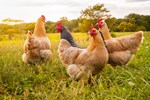Dr Virginia Marugan-Hernandez
Department: Pathobiology & Population Sciences
Campus: Hawkshead
Research Groups: Host-Pathogen Interactions and Vaccinology, IRLFS (Research Programme)
Virginia Marugan-Hernandez is a Senior Lecturer in Molecular Parasitology at the Royal Veterinary College (London). Her research focuses on coccidian parasites, with particular emphasis on their basic biology and interactions with host cells, aiming to develop novel strategies for parasite control. Currently, her work centres on chicken coccidiosis caused by Eimeria species. She investigates unusual parasite organelles and has developed an in vitro model to evaluate alternatives to existing anticoccidial drugs.
Following her PhD, Dr Marugan-Hernandez joined the RVC as a postdoctoral researcher in Prof. Tomley’s lab, where she worked on various molecular aspects of Eimeria spp., the parasites responsible for chicken coccidiosis. In 2018, she became an independent researcher as an RVC Research Fellow, continuing her investigations in coccidiosis. Since May 2023, she has been a member of the academic team at the RVC as a Lecturer in Molecular Parasitology within the Department of Pathology and Population Science.
In addition to her research, Dr Marugan-Hernandez holds a Qualified Teacher Status (QTS) from the Complutense University of Madrid and is a Fellow of the Higher Education Academy (FHEA) in Veterinary Education.
RELEVANT RECENT PUBLICATIONS
Chan PYK, Marti-Garcia B, Marugan-Hernandez V. Novel Organoids and ex vivo Models for Advancing Poultry Coccidiosis Research. Parasitology. 8:1-37.
Sanchez-Arsuaga G, Blake DP, Tomley FM, Marugan-Hernandez V. 2025. Study of dense granule proteins in Eimeria spp. identifies a limited repertoire with potential as vaccine candidates. Front Immunol. 16:1605984.
Arias-Maroto S, Aguiar-Martins K, Regidor-Cerrillo J, Ortega-Mora L, Marugan-Hernandez V. 2024. Reduction of chickens use to perform in vitro pre-screening of novel anticoccidials by miniaturisation and increased throughput of the current Eimeria tenella compound-screening model. F1000Reasearch 11:1135
Aguiar-Martins K, Tomley FM, Blake DP, Marugan-Hernandez V. 2024. Comparative study of Eimeria tenella development in different cell culture systems. PLoS One. 19(7):e0307291
De Hoest-Thompson C, Marugan-Hernandez V, Dessens JT. 2024. Plasmodium LCCL domain-containing modular proteins have their origins in the ancestral alveolate. Open Biol. 14(6):230451
Felici M, Tugnoli B, De Hoest-Thompson C, Piva A, Grilli E, Marugan-Hernandez V. 2023. Thyme, Oregano, and Garlic Essential Oils and Their Main Active Compounds Influence Eimeria tenella Intracellular Development. Animals (Basel) 14(1):77
Burrell A*, Marugan-Hernandez V*, Graefin Von Der Recke K, Aguiar-Martins K, Gabriel HB, Tomley FM, Vaughan S. 2023. Refractile bodies of Eimeria tenella are proteinaceous membrane-less organelles that undergo dynamic changes during infection. Frontiers Cellular and Infection Microbiology 13:1082622
Sidiropoulou E, Marugan-Hernandez V, Skoufos I, Giannenas I, Bonos E, Aguiar-Martins K, Lazari D, Papagrigoriou T, Fotou K, Grigoriadou K, Blake DP, Tzora. A. 2022. In vitro antioxidant, antimicrobial, anticoccidial, and anti-inflammatory study of essential oils of oregano, thyme, and sage from Epirus, Greece. Life 12(11):1783
Burrell A, Marugan-Hernandez V, Wheeler R, Moreira-Leite F, Ferguson D, Tomley FM, Vaughan S. 2022. Cellular electron tomography of the apical complex in the apicomplexan parasite Eimeria tenella shows a highly organised gateway for regulated secretion. PLoS Pathog. 18(7):e1010666
Soutter F, Werling D, Nolan M, Kuster T, Attree E, Marugan-Hernández V, Kim, S, Tomley FM, Blake DP. 2022. A novel whole yeast-based subunit oral vaccine against Eimeria tenella in chickens. Frontiers in Immunology 13:809711
Soutter F, Werling D, Kim S, Pastor-Fernández I, Marugán-Hernández V, Tomley FM, Blake DP. 2021. Impact of Eimeria tenella oocyst dose on parasite replication, lesion score and cytokine transcription in the caeca in three breeds of commercial layer chickens. Frontiers Veterinary Sciences 8:640041
Marugan-Hernandez V, Jeremiah G, Aguiar-Martins K, Burrell A, Vaughan S, Xia D, Randle N, Tomley F. 2020. The growth of Eimeria tenella: characterisation and application of quantitative methods to assess sporozoite invasion and endogenous development in cell culture. Frontiers Cellular and Infection Microbiology 10:579833
Sidiropoulou E, Skoufos I, Marugan-Hernandez V, Giannenas I, Bonos E, Aguiar-Martins K, Lazari D, Blake DP, Tzora A. 2020. In vitro anticoccidial study of oregano and garlic essential oils and effects on growth performance, faecal oocyst output and intestinal microbiota in vivo. Frontiers Veterinary Sciences 7:420
Pastor-Fernández I, Kim S, Marugán-Hernández V, Soutter F, Tomley FM, Blake DP. 2020. Vaccination with transgenic Eimeria tenella expressing Eimeria maxima AMA1 and IMP1 confers partial protection against high-level E. maxima challenge in a broiler model of coccidiosis. Parasites and Vectors 13(1):343
Burrell A, Tomley FM, Vaughan S, Marugan-Hernandez V. 2020. Life cycle stages, specific organelles and invasion mechanisms of Eimeria species. Parasitology 147(3):263-278
Pastor-Fernandez I, Pegg E, Macdonald S, Tomley FM, Blake DP, Marugan-Hernandez V. 2019. Laboratory growth and genetic manipulation of Eimeria tenella. Current Protocols in Microbiology 53(1):e81
-
Development of a poultry vaccine platform based on transgenic coccidia parasites and evaluation of immunoprotection against necrotic enteritis
The sustainability of poultry meat and egg global production, paramount to respond the worldwide demand for food, is challenged by poultry enteric diseases such as coccidiosis and necrotic enteritis.
his project aimed to develop a vaccine platform based on Eimeria parasites to protect chickens against pathogens of different origin. The first use to generate a prototype and evaluate a specific product against the re-emerging disease necrotic enteritis is expected to have future applications that could have a direct impact in human health by the targeting of zoonotic organisms that transfer disease from chickens to human, and which have importance in both high income and low-and-middle income countries (e.g. Campylobacter, Salmonella).

